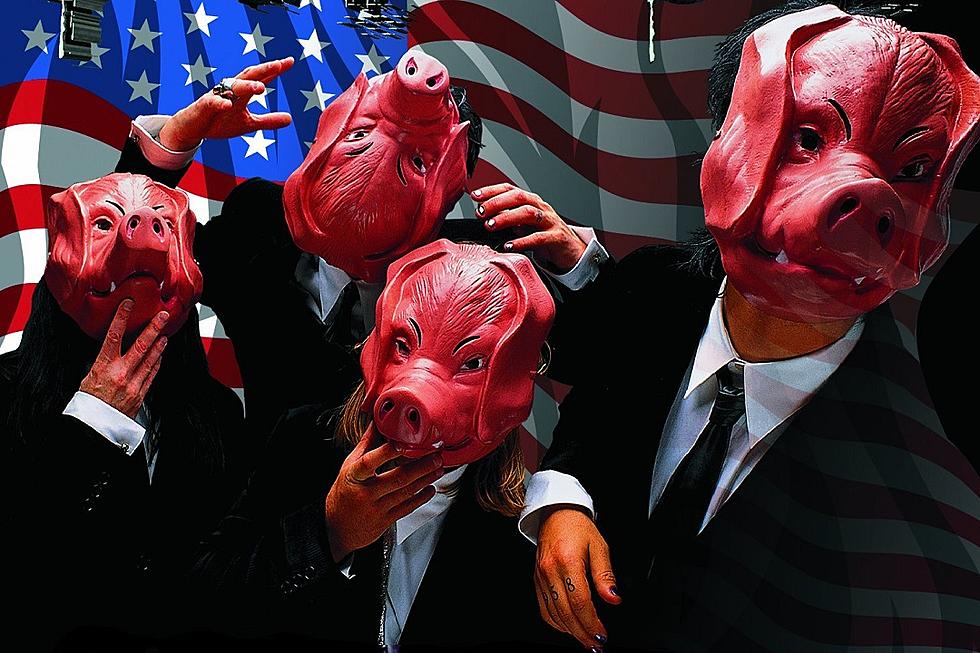
When Motley Crue Brought Back Vince Neil for the Confused ‘Generation Swine’
Motley Crue appeared to be indestructible going into the '90s.
Their 1989 album, Dr. Feelgood, was massively popular, and they seemed well equipped to weather the incoming grunge storm. They'd signed a $35 million contract with Elektra Records, then had success with the Decade of Decadence 81-91 collection and its hit single “Primal Scream,” which was released in late 1991.
Then, in true Crue fashion, it completely fell apart.
Singer Vince Neil was fired – or quit, depending who you ask – in February 1992. The group then brought in John Corabi, who sang with the Scream, and released a self-titled album in 1994. It wasn’t bad – quite the opposite, in fact – but it just wasn’t a Motley Crue LP in the eyes of many listeners. Motley Crue received mediocre reviews, and was dismissed for the most part by fans who wanted Neil as the band's singer and by mainstream audiences that had moved on to more modern sounds.
Without their original lineup, Motley Crue were in danger of becoming just another passe rock 'n' roll band. It was almost a death knell for the group. The tour in support of Motley Crue reflected as much, often with less than 1,000 people in attendance at the scaled-down venues. A new manager was hired in Allen Kovac and then work began on the next album. Tentatively titled Personality #9, it ended up bring released as Generation Swine on June 24, 1997, but only after a lineup change.
Helmed by producer Scott Humphrey, the record started to move into the direction of “some sort of electro-grunge record with Corabi,” according to bassist and primary songwriter Nikki Sixx in the band autobiography The Dirt. Mick Mars was, for all intents put on the shelf, with Humphrey reportedly leaning on Corabi for the decreased number of guitar parts.
“I thought Generation Swine was a cool record, experimentally wise, but there's a lot on there that really doesn't sound like a guitar,” Mars later told Guitar.com. “If I was like Robert Fripp of King Crimson or someone in Nine Inch Nails, it would have been cool, but for Motley it wasn't quite right. I would play some parts and producer Scott Humphrey would run it through a computer in a really bizarre way. I think putting out a product with John Corabi, and then putting out Generation Swine, alienated quite a few of our fans.”
Corabi faced constant criticism and was given confusing direction for nearly every note he sang, which he described in The Dirt.
“Nikki would jump on the intercom and say, ‘Crab, I’m kind of thinking of an old Bowie, Sisters of Mercy kind of vibe.’ Then Scott would hit the button and add, ‘But with a little Cheap Trick, Nine Inch Nails kind of thing.’ Finally, Tommy [Lee] would chime in, ‘Yeah, but make it lush like Oasis.’ So, I’d start trying to figure all this out, then Tommy would interrupt again and say, ‘Oh yeah, dude, I forgot to add that the tracks gotta be heavy, like Pantera.”
Listen to Motley Crue Perform 'Let Us Prey'
Exasperated, Corabi jokingly said he should just be a guitar player and not sing, a remark the band and management used as an excuse to oust him and bring back Neil, whose solo career was floundering. Neil back in the fold would immediately present the illusion everything was in its rightful place. The reality was anything but.
“The songs weren’t written toward Vince’s singing style or even his range,” Humphrey said in The Dirt, adding there was no clear musical direction in place. “Nikki wanted to be Nine Inch Nails one day and U2’s Zooropa the next.”
The sessions produced an album that, despite the return of Neil, barely sounded like classic Crue. It's steeped in computer programming and synthesized production. Sixx and Lee contributed lead vocals, which was both confusing and distracting. Plus, some songs just didn't belong on a Motley Crue record.
“Nikki didn’t like to have his lyrics scrutinized,” Humphrey said. “There was this line in this song called 'Glitter' that went, ‘Let’s make a baby inside of you.’ And I was like, ‘There is no way. You can’t put this line on the record.’ It was ridiculous. And he basically tried to say that it was the best thing he’d ever written."
Lee composed and named a track for his newborn son, Brandon, a gesture noble in sentiment but an embarrassment of a song with lines like, “Your mother gave birth to you with love inside / She had candlelight and songs of life.” That’s quite a stretch from "Shout at the Devil," which was given an aggressively industrial makeover on Generation Swine.
That’s one of the album's few highlights. “Anybody Out There” is a fast, punk-like number, “Flush” lacked the musical foundation to back its catchy melody and “Let Us Prey” is a genuine metal grinder. So the potential was there, but too many out-of-the-box influences and internal personality conflicts ultimately came into play. And while fans welcomed Neil back, evident in the record debuting at No. 4, the enthusiasm didn’t spread. Generation Swine fell all the way to No. 30 the following week.
The singer wasn’t surprised. “I hate that record,” Neil told SF Gate in 2011. “I didn't want to do those songs. I didn't want to be there. I probably quit five more times while we were recording. It was a tough record to make."
Motley Crue Albums Ranked
You Think You Know Motley Crue?
More From Ultimate Classic Rock









